Headteacher Alison Peacock helped move The Wroxham School out of special measures to Ofsted Outstanding in under three years.
There is a sense of confidence at The Wroxham School that is impossible to miss. It is everywhere, apparent in the comments of its staff and in the behaviour of its children – even the guinea pigs seem unfazed at being hauled out of their hutch on a cold morning for the attention of visiting journalists. It is communicated by the atypical but highly successful approach to primary education the school offers, by the colourfully decorated double decker bus parked up in its playground and the percussion-packed music garden that lies opposite. For a school which just seven years ago was languishing in special measures, that is some achievement.
That Wroxham, situated in affluent Potters Bar, Hertfordshire, in the heart of the London commuter belt, found itself in such a position in the first place might be something of a surprise. But if it is difficult to understand why such a situation arose, it is far easier to pinpoint why things have changed for the better. Speaking to its headteacher, Alison Peacock, about the improvement over which she has presided, it is soon obvious that the confidence in evidence throughout the school emanates from the top. For proof of that fact, you need look no further than her decision to take on the challenge at Wroxham in the first place. “This is my first headship,” she explains. “Before I had even applied, I knew I wanted to do things differently – even phoned the Head of School Effectiveness in Hertfordshire to ask whether the local authority would support me in what I had planned. Looking back on it, it was quite a brave – arrogant, almost – thing to do as a deputy head, but at the time it seemed like the sensible thing because if I was going to take the job on I needed it to work.
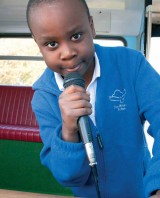 “At the time, I had a vision rather than a plan,” she continues, pointing to a piece of A4 paper on the notice board in her office. “I used this same slide in my interview. I was asked to explain where the school was going to be in five years. I said that we would have high academic standards and a culture of success; achievement for all, so that everyone felt valued; we would work in partnership with the local community, with secondary schools and industry; we would become a centre of excellence – which is quite a thing to say when you’re in special measures; we would be known for our standards of behaviour and citizenship; and that there would be breadth and balance in our curriculum.”
“At the time, I had a vision rather than a plan,” she continues, pointing to a piece of A4 paper on the notice board in her office. “I used this same slide in my interview. I was asked to explain where the school was going to be in five years. I said that we would have high academic standards and a culture of success; achievement for all, so that everyone felt valued; we would work in partnership with the local community, with secondary schools and industry; we would become a centre of excellence – which is quite a thing to say when you’re in special measures; we would be known for our standards of behaviour and citizenship; and that there would be breadth and balance in our curriculum.”
Those conducting Alison’s interview might have raised an eyebrow at the scale of her ambitions for Wroxham, but she has proved true to her word. The school’s most recent inspection report highlights its students’ excellent progress, its rich curriculum, and the skill and flair with which its teachers deliver learning in the classroom. On the back of these successes, Wroxham has been awarded Teaching School status, completing its transformation from underachiever to national role-model.
Both Alison’s vision and its realisation have much to do with her involvement with the University of Cambridge’s Faculty of Education. “I’ve been engaged with research throughout my professional life,” Alison confirms. “I did my Masters at Cambridge prior to the Learning Without Limits research project while I was a deputy head, and since I started at Wroxham we’ve had a research team here as part of the same project.”
Unsurprisingly, the conclusions the Learning Without Limits project has thus far drawn – in broad terms, that ideas of fixed ability can limit children’s learning, and how alternative approaches can yield more positive results – are firmly embedded in practice at Wroxham. Pupils are never told at what level they are working, nor set by ability. Instead, in the classroom they are encouraged to choose from activities of varying difficulty according to how confident they feel with the subject. The system even extends to the home, with parents only informed of their children’s level at the end of Years 2 and 6 respectively. “All of the research evidence shows us that to give grades actually depresses performance,” says Alison. “Amongst ourselves, of course we track every child’s progress – we wouldn’t have the ‘outstanding’ Ofsted judgements we have if we couldn’t show how much progress the children are making. But there’s a worry that the level has almost gained an identity in itself – the 2C-ness of being 2C – and that actually limits expectations.
“Part of the rationale behind it,” she continues, “is that it diminishes us as human beings to say that our scores in maths and English are a proxy for how good we are as people. But that’s what happens if you only focus on the standards. So, the child who is a wonderful sportsman, in some classes might not feel valued because their sporting skills are seen as of secondary importance to whether they can write a good story. Here, children learn that what’s important is the intrinsic motivation to learn, rather than the extrinsic motivation that you do something because you might get a sticker or a smile. That notion of challenging yourself, and challenging yourself again, and understanding that it’s not always going to be easy.”
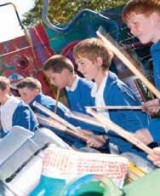 If Wroxham’s academic success can be attributed to this rejection of labelling children’s ability, it must also be seen in the context of its curriculum. Alongside her dayto- day duties at the school, Alison also leads the national network for the Cambridge Primary Review, and the template for a broad and balanced curriculum that this document has put forward underpins every aspect of the learning at the school. “Any reading that you do about primary and early years education will reinforce the idea that in order for children to be the best learners they can be, they need all of their senses to be engaged within learning,” Alison explains. “Children are like little plants – they need nutrition in terms of a rich curriculum diet and they need opportunities to engage with all of that so they can grow and blossom. The importance of a broad curriculum, one that’s arts focused with science and humanities and so on, is something I’ve believed in for a long time, ever since I first trained as a teacher. The Cambridge Primary Review and The Rose Review, both of which I contributed to, completely support that.”
If Wroxham’s academic success can be attributed to this rejection of labelling children’s ability, it must also be seen in the context of its curriculum. Alongside her dayto- day duties at the school, Alison also leads the national network for the Cambridge Primary Review, and the template for a broad and balanced curriculum that this document has put forward underpins every aspect of the learning at the school. “Any reading that you do about primary and early years education will reinforce the idea that in order for children to be the best learners they can be, they need all of their senses to be engaged within learning,” Alison explains. “Children are like little plants – they need nutrition in terms of a rich curriculum diet and they need opportunities to engage with all of that so they can grow and blossom. The importance of a broad curriculum, one that’s arts focused with science and humanities and so on, is something I’ve believed in for a long time, ever since I first trained as a teacher. The Cambridge Primary Review and The Rose Review, both of which I contributed to, completely support that.”
Whilst pupils are given opportunities to shape their learning, Alison is clear that rather than a pupil-led curriculum, Wroxham’s is most accurately described as a partnership between children and adults: “I think it’s important that the children’s horizons are constantly broadened,” she says. “If you were to say to a group of nine-year-olds ‘What do you want to learn about?’, they can only tell you what they want within the limits of their experience. But if you frame an enquiry with a group of children and say ‘This is something that we’re going to explore, what are the kinds of questions that you think would be really interesting to pursue?’, and you keep on having that dialogue all the way through and allow yourself to respond to the things that begin to emerge, then what you can have is a rich curriculum experience that’s rooted in subject knowledge as well.”
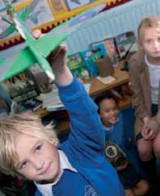 You don’t have to look far at Wroxham to find examples of this approach being put into practice. Year 4 teacher Stephen Davy is full of enthusiasm about the school’s curriculum, and the opportunities it affords him to motivate and educate his class. “The Cambridge Primary Review is discussed,” he confirms, “and a lot of its themes are in evidence at the school. We link all the subjects into a termly topic and try to incorporate lots of experiential learning. For example, our current topic is World War II – I met my current class at the end of Y3 to tell them about it, and find out what they wanted to learn about. We drew up a class mind map, and the process threw up lots of interesting questions that as a teacher you wouldn’t necessarily consider. Taking these ideas and cross-referencing them against the National Curriculum allowed me to map out what we could focus on in the classroom..”
You don’t have to look far at Wroxham to find examples of this approach being put into practice. Year 4 teacher Stephen Davy is full of enthusiasm about the school’s curriculum, and the opportunities it affords him to motivate and educate his class. “The Cambridge Primary Review is discussed,” he confirms, “and a lot of its themes are in evidence at the school. We link all the subjects into a termly topic and try to incorporate lots of experiential learning. For example, our current topic is World War II – I met my current class at the end of Y3 to tell them about it, and find out what they wanted to learn about. We drew up a class mind map, and the process threw up lots of interesting questions that as a teacher you wouldn’t necessarily consider. Taking these ideas and cross-referencing them against the National Curriculum allowed me to map out what we could focus on in the classroom..”
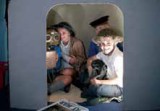 What also comes across from speaking to Stephen is that he feels supported – in terms of the licence he feels he has to experiment with new ideas in the classroom, and the training he has access to, to improve his own practice – and, perhaps even more importantly, valued for what he has to offer. Hearing the thoughts of other members of staff, and those of the children, it is clear he is not alone: proof that yet another element of Alison’s vision has been successfully implemented. “A really big part of what we’re trying to do is building an understanding of self and an appreciation of individuality,” she concludes. “That applies to everyone, so it’s not just the children but the adults as well. Everybody feels valued for who they are. And instead of being about everybody performing and everybody doing the same thing in the name of standards, it’s about being an individual in the name of standards; about adults being able to respond to every child, and every adult being able to find a way to improve as learners.”
What also comes across from speaking to Stephen is that he feels supported – in terms of the licence he feels he has to experiment with new ideas in the classroom, and the training he has access to, to improve his own practice – and, perhaps even more importantly, valued for what he has to offer. Hearing the thoughts of other members of staff, and those of the children, it is clear he is not alone: proof that yet another element of Alison’s vision has been successfully implemented. “A really big part of what we’re trying to do is building an understanding of self and an appreciation of individuality,” she concludes. “That applies to everyone, so it’s not just the children but the adults as well. Everybody feels valued for who they are. And instead of being about everybody performing and everybody doing the same thing in the name of standards, it’s about being an individual in the name of standards; about adults being able to respond to every child, and every adult being able to find a way to improve as learners.”
Immersed in such an atmosphere, it is no wonder that children and teachers are flourishing at Wroxham. Its model of creative and inclusive education has already proven its worth, and with Teaching School status secured and a leadership passionate about spreading the word, it may be one which is soon inspiring many other primaries to take a similar approach.
1. Catch the bus
 Few schools can lay claim to their own double decker bus; fewer to one kitted out as a reading area, with its own pupil-operated ‘radio station’ – introduced to improve verbal literacy. It is the most visible evidence of the creative approach to education that earned Wroxham ‘School of Creativity’ status as part of the now defunct Creative Partnerships project. “After our last inspection, Ofsted had to give us something to work on, so they said we should think about how our library was displayed,” explains deputy head, Roger Billing. “We looked into getting a train carriage, but it was very expensive, so we opted for a bus instead. Everything about it was an everybody project: Year 4 worked on designs for the outside, before the whole school voted to choose the winner; some of our parents painted a base coat on in the summer holiday, before we invited a graffiti artist in to decorate it, with the help of the winning pupil and a couple of her friends.”
Few schools can lay claim to their own double decker bus; fewer to one kitted out as a reading area, with its own pupil-operated ‘radio station’ – introduced to improve verbal literacy. It is the most visible evidence of the creative approach to education that earned Wroxham ‘School of Creativity’ status as part of the now defunct Creative Partnerships project. “After our last inspection, Ofsted had to give us something to work on, so they said we should think about how our library was displayed,” explains deputy head, Roger Billing. “We looked into getting a train carriage, but it was very expensive, so we opted for a bus instead. Everything about it was an everybody project: Year 4 worked on designs for the outside, before the whole school voted to choose the winner; some of our parents painted a base coat on in the summer holiday, before we invited a graffiti artist in to decorate it, with the help of the winning pupil and a couple of her friends.”
2. London’s burning!
 Exciting learning opportunities abound at Wroxham, as a visit to its class blogs will testify. Teach Primary’s visit coincided with the return of the Great Fire to a cardboard capital – the culmination of a Year 2 topic, which saw children’s hard work quite literally go up in smoke to strains of London’s Burning and the excited cries of half the school. The big event was captured in authentic sepia tones and can be viewed online (visit year1wroxham.wordpress.com)
Exciting learning opportunities abound at Wroxham, as a visit to its class blogs will testify. Teach Primary’s visit coincided with the return of the Great Fire to a cardboard capital – the culmination of a Year 2 topic, which saw children’s hard work quite literally go up in smoke to strains of London’s Burning and the excited cries of half the school. The big event was captured in authentic sepia tones and can be viewed online (visit year1wroxham.wordpress.com)
3. Outside influences
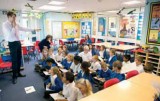 Visiting subject specialists add an extra dimension to Wroxham’s curriculum. “I work with the children by linking my PSHE session to their classroom topics,” explains Lesley Williams, a familiar face to children at the school and others of all ages across the local area. “So, with the children who are studying World War II, I’ve been talking about persecution and new beginnings. Year 2 is doing The Great Fire of London, so I talked about action and reaction – how on one hand the fire was a sad thing, but on the other it had a positive side in terms of halting the plague. “Having an outside speaker coming in offers reinforcement,” she says, “and the topics I address can be ones that are difficult for classroom teachers to tackle. The dance and the drama I use help create a sense of equality, too. The kids who aren’t shining in class academically may find that here they can excel, and that in turn gives them more confidence in the classroom.”
Visiting subject specialists add an extra dimension to Wroxham’s curriculum. “I work with the children by linking my PSHE session to their classroom topics,” explains Lesley Williams, a familiar face to children at the school and others of all ages across the local area. “So, with the children who are studying World War II, I’ve been talking about persecution and new beginnings. Year 2 is doing The Great Fire of London, so I talked about action and reaction – how on one hand the fire was a sad thing, but on the other it had a positive side in terms of halting the plague. “Having an outside speaker coming in offers reinforcement,” she says, “and the topics I address can be ones that are difficult for classroom teachers to tackle. The dance and the drama I use help create a sense of equality, too. The kids who aren’t shining in class academically may find that here they can excel, and that in turn gives them more confidence in the classroom.”
4. Pupil voice
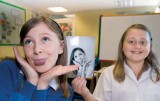 As part of the school’s efforts to offer an inclusive environment in which everyone feels valued, time is set aside for children to have their say on issues affecting the school. “We bill ourselves as a listening school,” says Roger Billing. “We have mixed aged circle groups that happen every week. So, for 15 minutes on a Tuesday morning, staff and children from Year 1 to Year 6 will sit down together. The Year 6 pupils lead the discussion, and together they’ll talk about a particular subject – from which charities they might like to raise money for, to how they could develop the school logo.”
As part of the school’s efforts to offer an inclusive environment in which everyone feels valued, time is set aside for children to have their say on issues affecting the school. “We bill ourselves as a listening school,” says Roger Billing. “We have mixed aged circle groups that happen every week. So, for 15 minutes on a Tuesday morning, staff and children from Year 1 to Year 6 will sit down together. The Year 6 pupils lead the discussion, and together they’ll talk about a particular subject – from which charities they might like to raise money for, to how they could develop the school logo.”
Alison Peacock is one of four contributors to the forthcoming Creating Learning without Limits (Open University Press, 2012), in which you can read more about education at Wroxham .
• The Wroxham School: wroxham.herts.sch.uk/Home.html
• The Cambridge Primary Review: http://www.educ.cam.ac.uk/centres/primaryreview
• Learning Without Limits: learningwithoutlimits.educ.cam.ac.uk
If your marking doesn’t affect pupil progress - stop it!
Ace-Classroom-Support
The side effects of teaching music
Ace-Music
How Financial Education Helps Children
Ace-Classroom-Support
